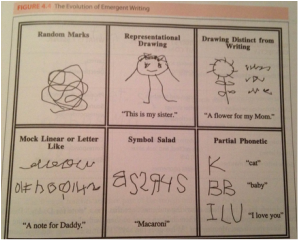Words of The Week: #6
Words of the Week: #6
1) Pretend Reading- a paraphrase or spontaneous retelling told by students as they turn the pages of a familiar story book.
(Bear, Donald R., et al. Words their Way, Pearson, 2020.)
Pretend reading is sort of the beginning step to actually start reading. It's considered a part of the emergent stage of reading. The child may not necessarily know words or how to form sentences, but they are trying to read. They are making the effort.
https://blogger.googleusercontent.com/img/b/R29vZ2xl/AVvXsEi6kwIu9zLOxyMCss0RZTa0RIdvQDpqhjIIBEH25GGQERswszw5XOsPy_BiGdTyiz6uIUKzezxpsCheYgOhwxCt-OpFhqoL83d6ahNqH-u0zsgVRTa3ObN2cBdJ48h8q8hmKmeFjDkCd36l/s1600/photo+2+%25287%2529.JPG
2) Memory Reading- an accurate recitation of text by finger-point reading.
(Bear, Donald R., et al. Words their Way, Pearson, 2020.)
Memory reading is when the child memorizes the words or sentences of a book. They don't really have trouble remembering how to say a word because they can recall it from their memory. Memory reading is important because it shows that the child can recall what they read previously. It can help them when they are asked what happened in the book, etc. However, it's good to get them out of their comfort zone and allow them to discover other books because memory reading isn't always good because they are just memorizing the book.
 https://readingeggs.files.wordpress.com/2015/05/child_imagination.jpg?w=669&h=450
https://readingeggs.files.wordpress.com/2015/05/child_imagination.jpg?w=669&h=450
3) Language Experience Approach- an approach to teaching reading in which students dictate to a teacher, who records their language.
(Bear, Donald R., et al. Words their Way, Pearson, 2020.)
This approach is important because it allows the teacher to become familiar with the way that particular child speaks and how they form sentences. It also allows the child or the whole class to look over what was said and improve it if there are any errors. Doing this can cause the child to start paying more attention to words and how they dictate them.
 https://i.pinimg.com/originals/11/54/61/11546187a991a39902af5476fc3590a2.jpg
https://i.pinimg.com/originals/11/54/61/11546187a991a39902af5476fc3590a2.jpg
4) Dialogic Reading- an approach to reading aloud that is designed to stimulate oral language and dialogue while enhancing students' ability to retell stories.
(Bear, Donald R., et al. Words their Way, Pearson, 2020.)
The teacher reads the book and retells the story. The students watch and later they retell the story as well in their own words. This is important because it allows them to build their discussion skills and their ability to take what they learned and expand upon it out loud.
 https://i.ytimg.com/vi/T_IIMZq8nJU/maxresdefault.jpg
https://i.ytimg.com/vi/T_IIMZq8nJU/maxresdefault.jpg
5) Interactive Read Aloud- a reading format to support emergent reading where the teacher reads aloud to the students and invites discussion and other participation.
(Bear, Donald R., et al. Words their Way, Pearson, 2020.)
Interactive read alouds are especially important. When you look at kindergarten classrooms, this is a staple. Kids need to be read to and asked questions about a book because it's how they learn language, etc. Kids can't learn how to read if it's not modeled to them.
 https://mrswillskindergarten.com/wp-content/uploads/2015/11/Slide2-7.jpg
https://mrswillskindergarten.com/wp-content/uploads/2015/11/Slide2-7.jpg
6) Mock Linear- a kind of pretend writing where children beginning to approximate the broader contours of the writing system, starting with the linear arrangement of print.
(Bear, Donald R., et al. Words their Way, Pearson, 2020.)
Mock linear writing is important stage because this is where the child's writing becomes more letter-like. They aren't using drawings to represent what they want to convey in their writing. Therefore, it shows that they are starting to develop knowledge of letters.

7) Alliteration- the occurrence in a phrase or line of speech of two or more words having the same beginning sounds.
(Bear, Donald R., et al. Words their Way, Pearson, 2020.)
Alliteration is important because it teaches children about initial sounds. It also makes reading and writing more fun for the child. It creates a rhythm.

Alliteration is important because it teaches children about initial sounds. It also makes reading and writing more fun for the child. It creates a rhythm.



Comments
Post a Comment